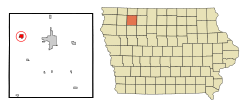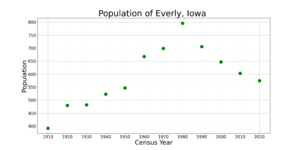Everly, Iowa facts for kids
Quick facts for kids
Everly, Iowa
|
|
|---|---|
| Motto(s):
"Proud of Our Past, Faith in Our Future"
|
|

Location of Everly, Iowa
|
|
| Country | |
| State | |
| County | Clay |
| Founded | 1884 |
| Incorporated | April 7, 1902 |
| Area | |
| • Total | 1.06 sq mi (2.75 km2) |
| • Land | 1.05 sq mi (2.71 km2) |
| • Water | 0.02 sq mi (0.04 km2) |
| Elevation | 1,362 ft (415 m) |
| Population
(2020)
|
|
| • Total | 575 |
| • Density | 549.19/sq mi (212.11/km2) |
| Time zone | UTC-6 (Central (CST)) |
| • Summer (DST) | UTC-5 (CDT) |
| ZIP code |
51338
|
| Area code(s) | 712 |
| FIPS code | 19-26175 |
| GNIS feature ID | 0456447 |
Everly is a small city located in Clay County, Iowa, in the United States. In 2020, about 575 people lived there. A river called the Ocheyedan River flows near the city.
Contents
A Look Back: Everly's History
Everly started as a town way back in 1884. Its first name was Clark. But there was already another town in Iowa called Clarke, so they changed the name to Everly. The city officially became a city on April 7, 1902.
Everly's Location and Land
Everly is located in the state of Iowa. You can find it using its coordinates: 43.159686 degrees North and -95.325222 degrees West.
The city covers a total area of about 1.11 square miles (2.87 square kilometers). Most of this area is land, about 1.09 square miles (2.82 square kilometers). A small part, about 0.02 square miles (0.05 square kilometers), is water.
Who Lives in Everly?
| Historical population | |||
|---|---|---|---|
| Census | Pop. | %± | |
| 1910 | 392 | — | |
| 1920 | 480 | 22.4% | |
| 1930 | 482 | 0.4% | |
| 1940 | 523 | 8.5% | |
| 1950 | 547 | 4.6% | |
| 1960 | 668 | 22.1% | |
| 1970 | 699 | 4.6% | |
| 1980 | 796 | 13.9% | |
| 1990 | 706 | −11.3% | |
| 2000 | 647 | −8.4% | |
| 2010 | 603 | −6.8% | |
| 2020 | 575 | −4.6% | |
| U.S. Decennial Census | |||
The number of people living in Everly has changed over the years. You can see how the population has grown and shrunk by looking at the chart.
Everly's Population in 2020
In 2020, there were 575 people living in Everly. These people lived in 260 households, and 157 of these were families. The city had about 549 people per square mile.
Most of the people living in Everly were White (96%). A small number were from other racial backgrounds. About 1.7% of the population identified as Hispanic or Latino.
The average age of people in Everly was 42.5 years old.
- About 23.8% of residents were under 20 years old.
- About 25.7% were between 25 and 44 years old.
- About 27.1% were between 45 and 64 years old.
- About 20.2% were 65 years or older.
The city had slightly more males (51.1%) than females (48.9%).
Everly's Population in 2010
In 2010, there were 603 people living in Everly. They lived in 270 households, with 171 of these being families. The population density was about 553 people per square mile.
Most people in Everly in 2010 were White (99.7%). A very small number were Native American or from two or more races. About 1% of the population was Hispanic or Latino.
About 30.4% of households had children under 18 living with them. The average age in the city was 42.8 years.
Schools and Learning in Everly
The Clay Central–Everly Community School District runs the public schools in Everly. Before 1993, Everly had its own school district. Then it joined with Clay Central to form the current district.
The local library is an important part of the community. It used to be the Fire Department and City Hall, but now it's a place for everyone to read and learn. You can find it on the east side of Main Street.
Famous People from Everly
Some interesting people have connections to Everly:
- Francis H. Case was born in Everly. He later became a U.S. Senator for South Dakota.
- Vern Fear was a professional baseball player who was born in Everly.
- Wattie Holm was another professional baseball player who lived in Everly.
- Connie Kunzmann was a talented six-on-six basketball player for Everly High School.
- Waldo Wegner was an Iowa State basketball player who was born in Everly.
See also
 In Spanish: Everly (Iowa) para niños
In Spanish: Everly (Iowa) para niños
 | Jessica Watkins |
 | Robert Henry Lawrence Jr. |
 | Mae Jemison |
 | Sian Proctor |
 | Guion Bluford |


